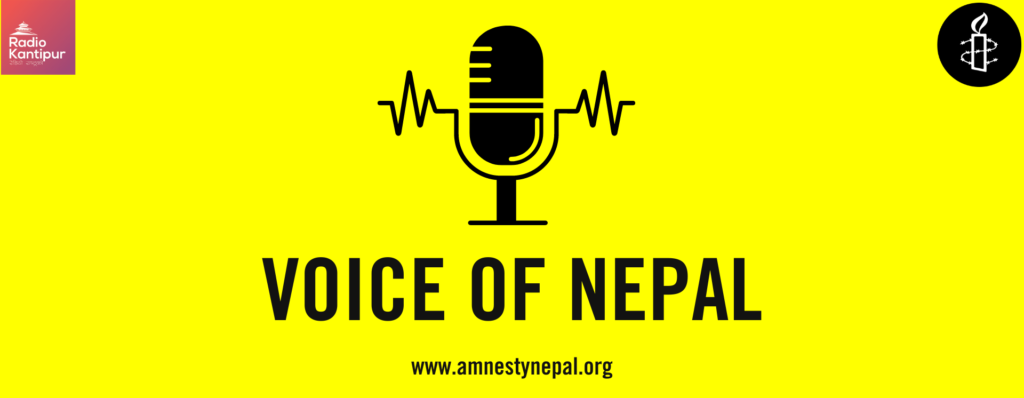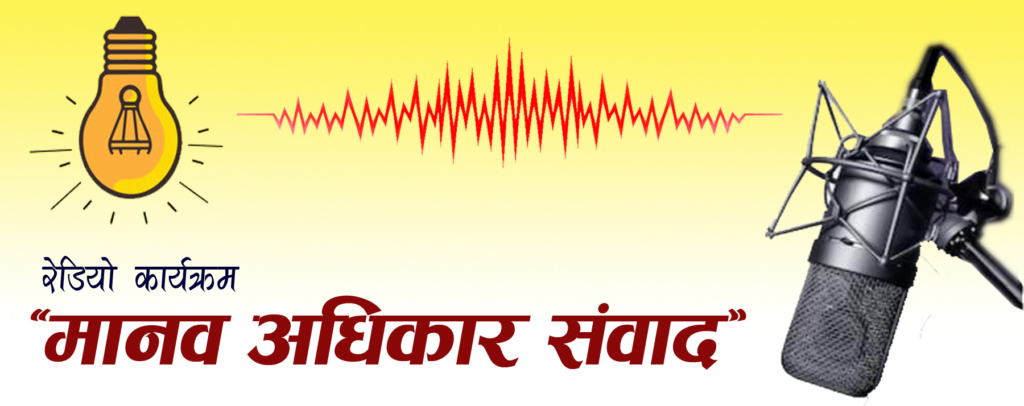Voice of Nepal: Transitional Justice Series

In 2006, the Comprehensive Peace Agreement was signed between the Government of Nepal and the Communist Party of Nepal (Maoist) to end the Second People’s Movement in Nepal. The signing of the agreement ended a decade-long insurgency and heralded the birth of a new Nepal, one that was federal and democratic.
But during the 10 years of war, thousands of people lost their lives, hundreds went – and are still – missing, and many families were displaced. In 2024, it will be 18 years since the agreement was signed, yet those who suffered at the hands of the State and the Maoist insurgents during the conflict have not received any form of justice.
This series by Amnesty International Nepal, hosted by journalist Kamala Panthi and aired live on Radio Kantipur, is an attempt to be an audio archive of sorts to document the discussions and debates on the transitional justice process and the stories and experiences of victims and survivors. It is also an attempt to raise awareness and promote justice, reconciliation, and accountability.
Episode 1 – The contemporary human rights situation in Nepal
In the first episode of the series, Amnesty International Nepal Director Nirajan Thapaliya gives an overview on the existing human rights violations in Nepal, shedding light on critical issues such as shrinking civic space, the State’s attempt to quell freedom of expression and the right to protest.
DownloadEpisode 2 – Justice for Maina Sunuwar
Twenty years ago, in 2004, 15-year-old Maina Sunuwar was arrested, tortured and killed by Nepal Army officials in Kavrepalanchok during the decade-long Maoist insurgency. While the district court convicted three soldiers and sentenced them to life imprisonment, they are yet to be behind bars. Maina’s mother, Devi Sunuwar, is still fighting for justice for her daughter’s murder.
In this episode, journalist Kamala Panthi speaks with Devi Sunuwar and with advocate Pushpa Poudel, who shed light on why justice is still being denied to the Sunuwar family.
DownloadEpisode 3 – Justice delayed is justice denied
In this episode, human rights defender and former chairperson of Amnesty International Nepal Charan Prasai speaks with journalist Kamala Panthi on the long road to transitional justice and whether justice will ever be delivered to those who suffered during the war.
DownloadEpisode 4 – Who killed my father?
Twenty-two years ago, Ram Mani Gyawali was brutally butchered to death by Maoist insurgents in his home in Arghakhanchi. And although more than two decades have passed since his killing, his daughter Anita has no idea why he was so mercilessly murdered. All she – and thousands of others like her who have lost family members to the war – want is the truth: why was her father killed? Who killed him? When will her family get justice?
DownloadEpisode 5 – Dreams shattered
In this episode, we touch on a topic that has perhaps not received the attention it deserves: the pain of hundreds of people who were handicapped in the 10-year-long armed conflict in Nepal.
Surendra Khatri was just 19 years old when he lost both his arms to an explosive left unattended in a jungle in Myagdi. He was a young man with dreams of enrolling in the Indian Army and taking care of his family, especially his three-month-old daughter. But his dreams were shattered by the insurgency.
DownloadEpisode 6 – Will my father ever come home?
In 1999, Rajendra Prasad Dhakal, an advocate, was arrested by Nepal Police in Tanahun for his alleged affiliation with the Maoists. His whereabouts till date are unknown. And his daughter Manjima Dhakal, a journalist, is no closer to knowing what happened to her father today than she was 25 years ago when the police took him away.
DownloadEpisode 7 – Why did this happen to us?
Twenty-four-year-old Tulsi Pariyar was only seven years old when she stepped on a mine and lost both her legs. Bhagwati Gautam was a teenager when lost a leg to an unattended landmine. They are among the thousands who had nothing to do with the war but have paid heavily in return. And the State has extended little help to ease their suffering.
DownloadEpisode 8 – The State’s apathy
This episode features Suman Adhikari, founding chairperson of Conflict Victims Common Platform, and Rajan Kuinkel, joint coordinator of Accountability Watch Committee and former AI Nepal Chairperson, talking about the politicisation of the transitional justice process, the conflict arising among victims’ groups, and the government’s general apathy towards bringing the justice process to a close.
DownloadEpisode 9 – Who is accountable?
It has been 19 years since Sushila Chaudhary’s three brothers – Arjun (21), Indra (19) and Bijaya (14) – were tortured and shot dead by Nepal Army personnel. Two years before this tragic incident, Sushila’s sister went ‘missing’ and till date remains so. This episode gives space to Sushila’s pain.
DownloadEpisode 10 – Is the law for us?
We have with us Advocate Dinesh Tripathi and Gopal Bahadur Sah, chairman of the Conflict Victims National Network, speak about the Supreme Court’s verdict to immediately appoint office bearers in the two transitional justice transitional justice commissions – the Truth and Reconciliation Commission, and the Commission of Investigation on Enforced Disappeared Persons – and why this decision could end up making the issue of transitional justice more politicised, leading to more delay.
DownloadEpisode 11 – The state of human rights
In line with the launch of Amnesty International’s latest report ‘State of the World’s Human Rights’, which assesses the condition of human rights in 155 countries across the world, AI Nepal’s Director Nirajan Thapaliya speaks about the state of human rights in Nepal in 2023 — with particular focus on the State’s failure to deliver justice, truth and reparations to victims of the 1996-2006 armed conflict, the use of unnecessary and excessive force to disperse and detain protesters, custodial deaths, caste-based discrimination, among others.
DownloadEpisode 12 – Truth, justice and reparations
Despite laws and two transitional justice bodies in place, why has the justice process not progressed for victims of the armed conflict? In this episode, former law minister, attorney general and Standing Committee member of CPN-UML Agni Kharel speaks with journalist Kamala Panthi about the delayed justice process and the failure of the State in delivering truth, justice and reparations.
DownloadEpisode 13 – The longing for home
In this episode, we have in conversation Kalyan Budhathoki, Shankar Budhathoki and human rights activist and lawyer Rukmani Maharjan, who talk about reparations, rehabilitation and justice for people who were forcibly displaced from their homes permanently during the Armed Conflict.
DownloadEpisode 14 – How long should one wait for justice?
Twenty years ago, Ganga Maya Adhikari’s son Krishna Prasad Adhikari was tortured and murdered by Maoist cadres. After years of the police and the government failing to take any action in the case, Ganga Maya, with her husband, Nanda Prasad, started staging a fast-unto-death from 2013. On the 333rd day of their fast, in September 2014, Nanda Prasad passed away owing to his deteriorating health. Eleven years on, his corpse still lies in Bir Hospital.
DownloadEpisode 15 – Fragmented families
During the 10-year-long war, many families were fragmented when loved ones were abducted by state security forces and Maoist rebels. Decades later, they are still waiting for their loved ones to come home. One such family is that of Bipin Bhandari, who was arrested by the Nepal Police in Kathmandu on June 17 in Kathmandu in 2002. We talk with his father, Ekraj Bhandari.
Download
Episode 1– नेपालमा मानव अधिकारको अवस्था
This is the first episode of a seven-episode podcast series titled “मानव अधिकार संवाद” produced by Amnesty International Nepal and DiGiFly. The series speaks about different human rights issues of today in an effort to educate and sensitise people. The first episode introduces listeners to the concept of human rights and the critical human rights issues that exist in Nepali society currently.
DownloadEpisode 2 – अभिव्यक्ति स्वतन्त्रता
This episode dives deep on a major human right that has been infringed upon time and again by governments around the world, including Nepal: the freedom of expression. In the podcast, experts discuss the importance and need of this right in a young democracy like Nepal, and why it needs to be protected.
DownloadEpisode 3 – जलवायु न्याय
This episode tackles one of the biggest existential crises of our current times: the climate crisis. The episode sheds light on the global climate crisis and then focuses on where Nepal stands in the global context and how climate change’s effects are being felt by the most vulnerable.
DownloadEpisode 4 – संक्रमणकालीन न्याय
This episode talks about one of the gravest human rights issues in Nepal’s modern history: transitional justice, focusing on the process thus far and the State’s lacklustre approach to it and the human rights violations that were committed in the decade-long conflict.
DownloadEpisode 5 – बलपूर्वक बेपत्ताको अवस्था
This episode will be talking about the 10-year insurgency period in Nepal, with particular focus on those people who were “disappeared” at the hands of the State and Maoist insurgents.
DownloadEpisode 6 – आप्रवासी श्रमिकको अधिकार
Thousands of Nepalis leave the country – legally and even illegally — in search of greener pastures elsewhere. In the process, many of their rights are infringed upon. What are these rights and how can they be protected? This episode addresses these questions.
DownloadEpisode 7 – सुरक्षित वैदेशिक राेजगार
In the final episode, we talk in detail about the safety and wellbeing of migrant workers and how they can ensure their rights are protected in destination countries.
Download
Episode 1
This is the first episode of an audio series titled “हजार माइलकाे यात्रा” (A journey of thousand miles) produced by Amnesty International Nepal and The Story Kitchen. The series highlights the impact of COVID-19 on Nepali migrant workers.
DownloadEpisode 2
How safe are destination countries for migrant workers? Our second episode addresses this question.
DownloadEpisode 3
In this episode we talk about the challenges faced by migrant workers who have returned home to Nepal amid the COVID-19 pandemic.
DownloadEpisode 4
DownloadEpisode 5
In this episode, we talk about the role of migrant networks in protecting workers’ wellbeing and safety.
DownloadEpisode 6
The final episode of our podcast features a panel discussion with Dr Thaneshwar Bhusal, Under Secretary at Ministry of Labour, Employment and Social Security; Som Prasad Lamichane, executive director of Pravasi Nepali Coordination Committee (PNCC), Ghanashyam Subedi, Chairperson of Phedikhola Rural Municiplaity, Syangja District; and Ashmita Sapkota, Campaigns Coordinator at Amnesty International Nepal.
Download


